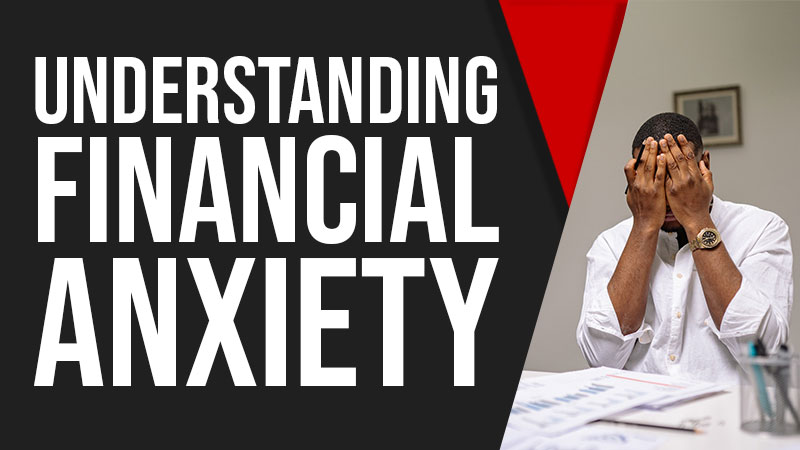Understanding Financial Anxiety and 8 Ways to Control It

Did you know that money could be the root of your anxiety? It’s normal for you to worry about your bills and expenses; people tend to get nervous or worried when they have to check how much cash remains in their account. However, you might be more agitated than you usually would be. Perhaps checking your bills is so stressful that you begin to hyperventilate. Alternatively, you might actively avoid your friends and family because you don’t know if you can afford to join their plans. This type of overwhelming is known as “financial anxiety.” Keep reading to learn more about this condition and how you can control it.
What is financial anxiety?
Financial anxiety is an obsession with your finances. You might notice that you’re constantly checking your accounts or billings compared to others. This restlessness comes from a fear of giant costs or losses, even when none have occurred yet. In other words, you become so fixated on protecting your money that you start feeling paranoid.
What’s worse about financial anxiety is that it can be irrational. You’d still be nervous about losing your money even when you’ve cleared your existing debts and fees. It can also impede your ability to make financial decisions. For example, you plan on renovating the house but become stressed at the potential costs. To avoid this, you decide to forego any projects and leave your property in disarray. This attitude can be dangerous when you need to make decisions about repairs, insurance, and other costly ventures.
How can financial anxiety hurt you?
Any form of anxiety can be dangerous to your health. Financial anxiety, however, can cause serious money problems later on. Here are some ways that this economic stress hurts you and your future.
You start to avoid money-related concerns.
Avoidance is a common tactic amongst those with anxiety. These people want to stay away from any possible stressors to the point that they actively keep their distance. You might be suffering financial anxiety when you can’t bring yourself to look at your bills. Letters about your credit score or insurance plans could make you feel nervous. If you notice that you leave money-related mail or e-mail unopened, you might be trying to avoid the matter entirely.

You refuse to adjust your budget.
A daily budget is an excellent way to manage your expenses. However, there will always be times when you might have to spend a little more than usual. While staying within budget is good, you can’t deny that some exceptions could occur. Financial anxiety can ruin that and make you stingy with your cash. Any additional expenses that you did not expect might infuriate you to no end. You might be overly conscious about your money if you find yourself consistently losing your temper at small and unplanned costs.
You constantly turn your attention back to money.
Have you ever tried to fall asleep or read a good book, only to start thinking about your retirement money? It’s normal to think about your investments regularly, but it shouldn’t ruin your ability to relax. The problem with financial anxiety is that you constantly think of your costs and funds. In effect, your ability to focus or concentrate gets reduced. For example, you have a digital media marketing plan to make, but you can’t stop thinking about your Roth IRA payments. Because you can’t focus, you won’t be able to make the marketing plan or optimize it. Even worse, the anxiety could affect your physical health and cause problems like insomnia, fatigue, and body aches.
You struggle to make any financial decisions.
Financial decisions might be the most challenging part of your life when you become money-obsessed. You might struggle to choose when to buy groceries or pay your bills because you don’t want to lose money. It’s normal to worry about our expenses, but being unable to make any financial decision is terrible. For example, you might be so nervous that you can’t decide to buy soap for the house. Minor purchases become difficult, and significant expenses become debilitating. If you can’t decide on buying soap, how much more for when you need to pay for medical emergencies or house repairs? In short, financial anxiety can mess up your decision-making in all money matters.
Eight easy ways to control financial anxiety
By understanding financial anxiety, you can learn how to overcome it. It may seem complicated, but managing your fears is easier than you think. Here are eight simple tricks to help you overcome your money worries.
1. Root out the source of your stress.
The first step in fighting against any anxiety is rooting out the source. Ask yourself what exactly you are afraid of. You might be overly concerned about your current expenses or bills. Conversely, you could be preoccupied with the fear of heavy purchases or costs that can ruin your wallet. What matters is that you identify the cause of your anxiety.
Once you know what you’re afraid of, you can start to take proper action to control it.
2. Create an emergency fund.
While financial anxiety can be irrational, it’s still based on legitimate worries. For example, you may be concerned about emergencies, like medical problems or car accidents. To assure yourself, invest in an emergency fund. This type of account is separate from your savings. These backup funds are meant for unexpected costs; in other words, you have the extra money if you encounter an unplanned emergency. To ensure you don’t use up the cash, consider a time-lock deposit to let it grow until a few years later. Once you withdraw from the account, you’ll have plenty of resources to cover your repairs or debts.
3. Track your expenses and budget.
You might be so afraid of losing money that you try to avoid any expense actively. This kind of behavior is unrealistic and dangerous. What you can do instead is to list down and track your costs accordingly. Use a spreadsheet or a financial planner to list your daily budget and purchases. Examine what you need to buy and how much you might pay. You can see how much you pay per item by having an accurate list of funding and expenses. More importantly, you ground your fears into an organized system.

4. Consider cutting back on expenses.
One reason that you could be worried about your finances is that you tend to overspend. Impulsive purchases and needless luxuries can damage your savings and budget plans. You might start to fear going outside because you always lose money. To help you curb this habit, remember to look at all purchases you made at this point. Look at what you’ve bought and how often you use it. Apply this mindset whenever you start to consider buying something.
For example, food is always important. However, what matters most is that you benefit from your meal. Would you rather spend money on a filling meal or a delightful but expensive snack? Once you examine your priorities, you can see which purchases aren’t worth the cost.
5. Negotiate with credit card companies and lenders.
Another reason you’d have financial anxiety is due to existing debts with credit card companies and lenders. Perhaps you’re trying to pay off these bills, but you’re struggling to make ends meet. If you’re incredibly nervous about the monthly fees, try to talk it out with the lenders. Explain your situation and ask for potential options. Perhaps they can lower your minimum payments in exchange for added years. Alternatively, you could negotiate for lower interest rates. Contrary to popular belief, credit card companies and lenders can be approachable. Explaining yourself will be much easier than expected to work out a compromise.
6. Consult with a financial advisor
Financial anxiety is not realistic, but it can still cause you to feel afraid and unsure. To keep your mind at ease, always consult with a financial advisor. By having them review your economic history, they can alert you of any potential problems in the future. For example, they can outline how your student debt’s interest rate could cost more than you planned. In addition, these experts can explain to you how stocks, bonds, and other investments work. With their help, you can create more revenue through an investment portfolio to bolster your bank account.
7. Connect with your friends and family.
While a financial advisor is suitable for professional advice, you might want someone you can trust. Consider talking to your close friends and loved ones about your money concerns. They may have also gone through financial anxiety. Discussing your fears with them gives you a new perspective on how you’ve handled your money. More importantly, you can safely confide in them because you know they are trustworthy. Having someone to talk to is always helpful in all cases of anxiety, especially regarding finances.
8. Remember that you’re human.
Lastly, you might be afraid of making mistakes with your money. Perhaps you’re worried about overspending or using a poorly calculated budget. While these can happen, remember that you’re only human. It’s normal to make mistakes. Everyone has failed with their finances at some point. The crucial step is what you do with your errors. Use these mistakes as a stepping stone to do better for yourself and your money. You can view your slip-ups as an important lesson on what to avoid. Once you reframe your mindset, you’ll feel much better and less afraid about making financial choices.
In summary
Financial anxiety is an irrational fear that causes real-life stress and pain. You could lose hours of sleep and spend time overthinking how your money will get affected. Understanding this type of anxiety can help you understand why you are afraid. The possible reasons for your fear include overspending, poor budgeting, and existing debts. By following these eight tips, you can start to control your anxiety and develop a better financial plan. Above all else, you must remember that you’re only human. No matter your mistakes, you can always bounce back and start over.

Thank you very much for reading this article! If you found this article helpful, please don’t hesitate to share this article with your family and friends. If you want to learn more about becoming a millennial millionaire, get a copy of my FREE book here! I will share real-world steps and techniques you can use to grow your finances.
- 1st United Credit Union. Accessed on July 26, 2022. Dealing with Financial Anxiety: How to Decrease Stress Around Money.
- Better Money Habits. Accessed on July 26, 2022. 6 Tips for Handling Financial Stress.
- Bryan-Podvin, L. (2022, April 6). Financial Anxiety: 6 Ways to Feel Less Stressed About Money. SELF.
- Klontz, B. (2020, October 15). Tips for dealing with financial anxiety. CNBC.
- Ratini, M. (2021, August 18). How to Feel Less Anxious About Money. WebMD.
- Robinson, L., & Smith, M. (2021, November). Coping with Financial Stress. HelpGuide.Org.
- Suknanan, J. (2022, June 22). Feeling anxious about your finances? Here’s what you can do to calm your nerves. CNBC.
- Swaim, E. (2022, May 13). Money Anxiety Is Common, But You Don’t Have to Handle It Alone. Healthline.
Copyright © 2023 Munif Ali. All rights reserved.

